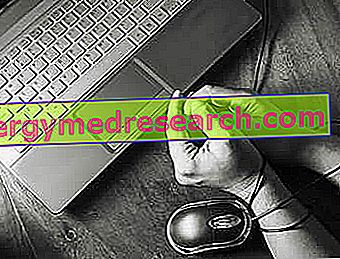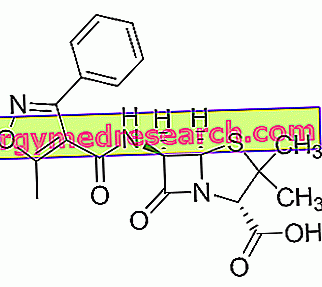Generality
Internet addiction is a disorder of impulse control, which pushes the person who suffers to make excessive and pathological use of computers, tablets or mobile phones with a connection to the Internet. This behavior gradually leads to total absorption of the subject and can have drastic consequences on lifestyle, interfering with normal daily actions.

Some people even spend entire days and / or nights on the Net, without being able to log off, while all the activities they were previously doing go to compromise themselves considerably.
The problem is, unfortunately, difficult to deal with from a therapeutic point of view, since the use of this technology is often related to the pursuit of pleasure and happiness.
In psychiatric literature, Internet addiction, also called Internet addiction, is best known by the original English name " Internet Addiction Disorder" (IAD) .
Causes and risk factors
In many respects, the Internet allows an improvement in people's lives, but, at the same time, it can represent a danger for those who do not know how to use them adequately and, unfortunately, risks using it in a pathological way.
Through social networks and other technological products, people want to broaden their circle of contacts, seek a confrontation and try to reinforce the ideal image they have of themselves by uploading messages, photos and videos. In some cases, these subjects end up isolating themselves, losing track of time, almost in a state of dissociation, and tend to replace the real world with an artificial object with which they try to build their own personal world (in this case virtual ).
Young single men, university students, middle-aged women and individuals with lower education levels are particularly vulnerable to developing an Internet addiction.
In addition, people with obsessive-compulsive personalities, tending to social withdrawal, extreme shyness and low self-esteem or with marked aspects of inhibition in interpersonal relationships seem more at risk of developing an Internet addiction. The phenomenon can also be favored by the presence of other behavioral disorders (eg ADHD, attention deficit hyperactivity disorder). Internet addiction can also be favored by unfavorable situations and life events, such as marital conflict or work problems.
Some types of pre-existing mental disorders, such as:
- Depressive disorder;
- Obsessive-compulsive disorder;
- Bipolar disorder;
- Sexual Compulsion;
- Pathological gambling.
Even the risky behaviors (drug abuse, social anxiety disorders, isolation, etc.) and the psychopathological potential of the network (anonymity and feelings of omnipotence that can degenerate into pedophilia, creation of false identities, etc.) can predispose to the Internet addiction.
Types of addiction
The numerous activities that can be carried out online ensure that Internet addiction is not a homogeneous category of disorders.
Some people are dependent on the Internet in a more generalized way and not associated with some of its specific functions; others, however, show a specific propensity, in which the subject finds only certain aspects of the web gratifying, such as online bets, virtual sex, shopping or chats.
In general, however, it seems that the people who develop an Internet addiction are those who use this technology for recreational activities (eg online video games, shopping and chat), rather than a more purely instrumental use, that is associated with electronic correspondence (and -mail) and searching for information.
Internet addiction can therefore manifest itself in various forms, such as:
- Cyber-sex addiction (virtual sex addiction) : a tendency to dedicate time to the use of online pornographic material or chat-room for adults only;
- Cyber-relational dependence (or from virtual relationships) : tendency to establish relationships with people met online; the virtual friends soon become more important than the real ones and the family. In many cases, this translates into marital instability or interruption of significant relationships;
- Net compulsions : tendency to compulsive behaviors such as gambling, online auctions or compulsive online shopping;
- Cognitive overload (information overload) : search for information via the web;
- Computer addiction : involvement in virtual games in which the subject participates in constructing a fictitious identity.
Symptoms
Characteristic behaviors of Internet addiction
Internet addiction can determine a wide range of behaviors, characterized by underlying problems in impulse control and difficulty in regulating emotional states.
Some distinctive elements, however, allow specialists to identify the risk of developing this problem:
- Dominance : activity dominates the subject's thoughts and behavior, assuming a primary value among all interests. The person develops a strong desire to connect to the Internet and expresses the need to increase the time spent at the computer.
- Changes in mood : at the beginning of the activity, the subject experiences an increase in excitement or greater relaxation as a direct consequence of the encounter with the object of addiction.
- Tolerance : the subject progressively increases the amount of Internet connection time to reach the desired excitation, since the effect decreases and an addiction develops. This involves drastic changes in one's habits or lifestyle to spend more time on the Net; Internet addiction can result, for example, in an overall decrease in physical activity or a sleep deprivation.
- Withdrawal symptoms : when the prolonged and heavy use of the Internet is interrupted or reduced, the subject manifests mental and / or physical discomfort: psychomotor agitation, anxiety, obsessive thinking of what is happening on the web, fantasies or dreams, voluntary or involuntary movements of the fingers during beating etc.
- Conflict : the subject comes to neglect family affections and friends and reduces socialization; because of the dependent behavior, inter-personal internal conflicts can develop either between the subject and those who are close to him.
- Relapse : the subject has the tendency to restart the activity after having interrupted it; when the use of the Internet is limited, on the other hand, it shows irritability, depression or emotional instability.
People who suffer from Internet addiction typically make prolonged use of the network (even 40-50 hours a week), which acquires central importance at the expense of other fundamental activities. Thus, there is an alteration of the temporal experience: one of the activities most easily sacrificed is sleep, both in quantity and in rhythm of rest-wakefulness, arriving sometimes to totally exchange the night for the day.
The consequences of Internet addiction are evident when the subject comes to neglect school or work commitments, social relationships and his own person (physical health and psychological state).
In addition to psychological problems, in many cases, we are witnessing the presence of real physical symptoms, a consequence of the prolongation of long periods of activity on the net in situations that are not ergonomic (such as carpal tunnel, diffuse neck and back pain, problems at sight etc.).
Signals to watch out for
The manifestations produced in the individual who makes a pathological use of the Internet include:- Apathy and tiredness;
- Difficulty getting up in the morning (loss of sleep, sleepless nights, etc.);
- Decline in academic or professional performance;
- Change in life habits;
- Slow and progressive distancing from friends (loss of interpersonal relationships);
- Abandonment of other forms of entertainment (TV, sports, music, reading, etc.);
- Irascibility and nervousness;
- State of apparent well-being and serenity in front of the PC;
- Anxiety, psychomotor agitation and depression associated with being off-line.
Diagnosis
Internet addiction generally falls within the sphere of impulse control disorders, characterized by the subject's inability to resist an impelling temptation, preceded by a feeling of increasing tension and excitement followed by pleasure, gratification and relief. This category includes conditions such as kleptomania, pathological gambling and pyromania.
Regarding Internet addiction, however, this definition is not unique and accepted by all. Indeed, some scholars argue that the problem cannot be considered a specific psychiatric disorder, but rather a psychological symptom that can connect to different diagnostic and clinical conditions.
In the most recent version of the "Diagnostic and Statistical Manual of Mental Disorders" (DSM-5), the last term used to describe this problem is " Internet Gaming Disorder" .
Treatment
When the abuse of the Internet is obvious, it is advisable to contact the specialists. The approaches to managing the pathological use of the web are essentially the same as those used for other types of addiction, and include psychotherapy and cognitive-behavioral therapy, aimed at managing impulses and the habit that cannot be renounced.
The psychotherapeutic intervention must gradually reduce the pathological behavior, but, at the same time, identify alternatives, sufficiently rewarding, that can replace it, helping the subject to overcome any socio-relational difficulties.
Usually, the prescription of psychiatric drugs is not foreseen, except in cases where there is not associated an important level of depression.
From the preventive point of view, for a correct use of the Internet, instead, it is necessary to limit the amount of time spent daily on the computer, trying to alternate these moments with social activities or other entertainment.



